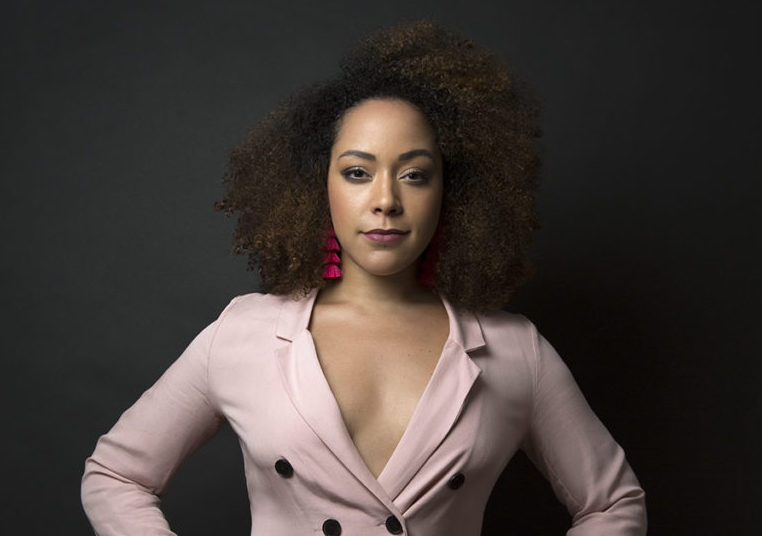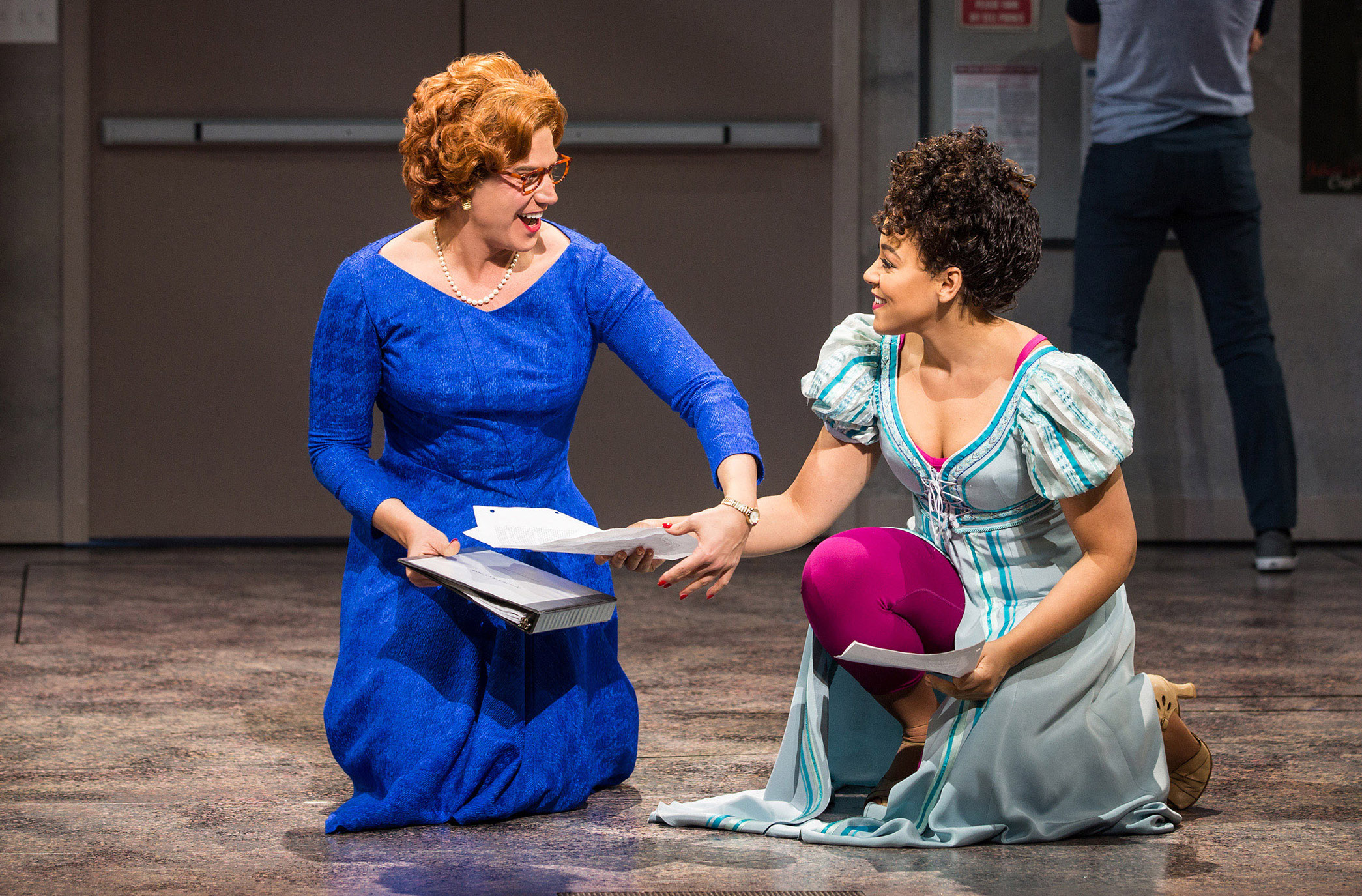Shortly after receiving the script, actress Lilli Cooper fell in love with Broadway’s “Tootsie.” For one thing, as a woman of color, she was auditioning for the role of Julie Nichols, the character originated by Jessica Lange in the 1982 film. She was also excited to watch the show evolve into a story more appropriate for 2019 — and the #MeToo era.
Thus far, Cooper’s work in “Tootsie” has earned many accolades including a Tony nomination for Best Featured Actress in a Musical. The show sees out-of-work actor Michael Dorsey (Santino Fontana) posing as a woman, Dorothy Michaels, in order to get a role on Broadway.
Cooper’s other Broadway credits include “SpongeBob SquarePants,” “Wicked,” and “Spring Awakening.” She has also appeared on-screen in “The Post” and “The Good Fight,” among other titles.
We chatted with Cooper about stepping into Lange’s shoes, how a predominantly male creative team made the story more empowering for women, and why “Tootsie” is making a comeback post-#MeToo.
“Tootsie” is currently playing at the Marquis Theatre.
This interview has been edited.
W&H: Congrats on your Tony nomination! How does it feel both for you and the show to be getting so much critical acclaim?
LC: Being recognized feels so incredibly special. We have worked really hard on this piece, so the recognition feels like a culmination of a lot of hard work and devotion to creating this show together. It just feels so awesome to be recognized amongst the other nominated actors in this show and the entire creative team. It’s very special.
W&H: Like your character Julie Nichols, who is an actress, you have played some very strong roles on Broadway. Do you purposely seek out specific kinds of women to play?
LC: Good question. I don’t think that I’m quite at the point where I can pick and choose what I’m doing, but I get really excited by the prospect of auditioning for roles like this. When my audition for “Tootsie” came along, I knew it was something that I wanted to be a part of. I had never worked with this particular creative team before, but I admired their work. I knew they would create something fantastic, updated, and new. Their openness to seeing me for the audition and every type of woman in the city for this show was an eye-opener. They had an openness in trying to find the right woman for this role from the get-go because she’s very updated from the movie. I feel so lucky that I get to play her every night.
W&H: Speaking of updates, when you first got the script for “Tootsie,” what did you think of the play’s changes and what was the collaboration like for you and the rest of the cast in terms of having input?
LC: I didn’t get a copy of the entire script until my final call back so I wasn’t able to read the whole show, but the final scene was what made me fall in love with the show. One of the biggest and most important shifts that [book writer] Robert Horn made from the film to our show is that Julie is no longer this codependent woman who needs help from Michael. It’s rather the opposite, where Michael learns and grows from Julie. That was something I was really drawn to.
On top of that, the collaboration started before rehearsals began. Robert would call me on the phone to get to know me and have conversations about Julie. He was really passionate about fleshing the character out and getting my input. Coming from a predominantly male creative team, they made a strong effort in hearing out and collaborating with the women in the show.
W&H: How has that felt for both you and your fellow female cast members?
LC: During rehearsals, the script would change constantly. We would get new pages and lines almost every day. Julie’s character has really transformed since Chicago, our out of town try-out, to Broadway. Every time Robert wrote something new for Julie, it became a breath of fresh air for all the women in the cast. We would look at each other and be grateful and excited and proud of this woman being developed in the show. It felt like a communal process and a discussion.
W&H: You play alongside some amazingly talented women including Julie Halston and Sarah Stiles. What is the camaraderie like amongst the women of “Tootsie”?
LC: I consider it a master class in comedy. It’s like walking into a room of veterans, comedic geniuses, and brilliant artists. On top of that, we are all really good friends which makes the chemistry on stage all the more palpable. I look up to Julie and Sarah as artists, but also as friends, and I feel lucky that I get to have that relationship on and off stage with them.
W&H: Let’s talk about Jessica Lange. What was it like stepping into her shoes as Julie Nichols?
LC: I definitely looked up to her before I took this role. I have always admired her career. I’m actually sitting here in my dressing room, looking at a picture of her. I love looking at it every day for inspiration. What’s really special is that I never imagined I would play a role that Jessica Lange originated. It’s a very unique and special thing to say. The only way I can do that is because of how the creative team has updated the play and changed it.
W&H: These updates are so important to you. If the creators hadn’t have changed the play, it sounds like it may not have interested you and the rest of the cast to even be in the show.
LC: Absolutely. Those are conversations that we’ve had with the creative team and with the actors since the beginning. We know how problematic the film would be today. 1982 was a completely different time. There was never a question of whether or not the team would adjust the story or writing.
W&H: Would you say that more types of roles that interest you are being created for both you and others post-#MeToo and #TimesUp — for women of color specifically?
LC: I definitely think things have shifted and changed, but I also think that we have a long way to go and will for a while. I feel lucky to have played these strong-willed, passionate women on stage. I feel that my career is really unique in that way, and I hope that this opens the door for more young women of color to play roles like this.
I had a few role models that I looked up to when I was young. It was those individual women on stage that made me think I can do this — Audra McDonald is one who comes to mind. I hope I can be that person young women of color can look up to and see themselves in. I want there to be more and more of them constantly.
W&H: You have so many powerful moments and songs in the show. Which one stands out for you?
LC: I have two favorite moments in the show. One is the first song I sing on the bench called “Then There Was John” about the sacrifices Julie has made to do what she loves. That’s the moment Michael sees similarities in Julie and the incredible passion she has for her craft. They find somewhat of a mirror to each other, that they have this in common, that they both love what they do so much that they are willing to sacrifice everything in their lives for it. It feels so honest, so true, and so close to home. I’ve experienced the sacrifice and risk of outside factors in order to do what we do. Our career as actors is really challenging and very different from other careers in the world. I connect to that moment most in the show.
The second most powerful moment in the show for me is the last scene in the show between Julie and Michael. She never gets to speak to Michael as Michael until that moment. It’s really powerful because he comes to apologize and he comes to prove that he has grown and changed. But she really shines a light that he can never understand the experience as a woman.
W&H: That’s particular to the show, right? Not to the film.
LC: Exactly. That’s one of the biggest changes from the film. I think that the Michael Dorsey character got off somewhat scot-free in the movie, and we knew that wasn’t okay. He needed to develop a conscious and understanding of the terrible choice that he made. Julie really opens his eyes to that.
W&H: Your dad [Tony winner Chuck Cooper] has been a pivotal part of your career choices, I imagine. What has it been like growing up with his support and guidance?
LC: I don’t have anything to compare it to. It’s just home. I’ve been so exposed to it my entire life. I was backstage in his dressing rooms starting at age five, feeling comfortable both on and off stage. It’s where I belong. It enabled me to think about both ends of the spectrums of successes of an actor. He won a Tony Award when I was seven years old, and I also witnessed when he was on unemployment and struggled. That has helped my parents support me in this career. They knew I completely understood what this world is all about.
W&H: Lastly, what kind of work do you find yourself gravitating towards and what are you working on next?
LC: I hope I can start to choose the roles that I play. If I can continue to play these strong, independent women, I want to do that. I also want to represent the flaws of nature. It’s not just playing these strong characters. I want to play every type of role out there.








